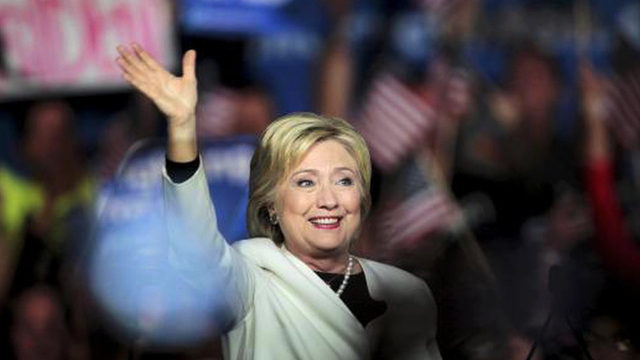By Amy Goodman & Denis Moynihan
Now that Super Tuesday is behind us and the field of presidential candidates is narrowing with the suspension of Dr. Ben Carson’s campaign, a potentially paradigm-shattering general election looms ever closer. “The stakes in this election have never been higher,” Democratic candidate Hillary Clinton said in her speech after she had been declared the victor over Sen. Bernie Sanders in seven of 11 Super Tuesday states. As Donald Trump, piling victory upon victory on top of insult upon insult, edges closer to clinching the Republican nomination, the GOP is in chaos, with some predicting a historic split in the party. The presidential race to date has been well-characterized by a line of closed captioning text from a recent Republican debate: “unintelligible yelling.” The circuslike atmosphere masks deeply troubling statements made by several candidates that fan the flames of racism, white supremacy and xenophobia. It also deflects attention from a critical, and worsening, deficit in our democracy: the attack on the right to vote, and in particular, the wholesale disenfranchisement of close to 5 million Americans, mostly people of color.
Race has been a defining issue in the 2016 election season. On the Republican side, there are overtly racist statements by front-runner Donald Trump, railing against Mexicans as “rapists” and refusing to denounce the former Ku Klux Klan Grand Wizard David Duke after Duke endorsed him. Trump said of an African-American protester who was attacked by Trump supporters at one of his rallies, “Maybe he should have been roughed up.” Trump also is a proud retweeter of the Italian dictator Benito Mussolini. When asked by NBC’s Chuck Todd if he wanted to be associated with a fascist, Trump replied, “I want to be associated with interesting quotes.”
Republicans fear that a Donald Trump candidacy will cost their party not only a shot at the White House, but also control of the Senate and House of Representatives. That is where the torrent of restrictive voting laws comes in. The American Civil Liberties Union has noted that 10 states will be implementing new restrictive voting laws that will impact up to 80 million voters, and could decide the assignment of 129 electoral votes out of the 270 needed to win the election. Dale Ho of the ACLU writes, “These laws range from new hurdles to registration to cutbacks on early voting to strict voter identification requirements.”
Denial of the right to vote for those who have been convicted of felonies is another way that voter participation is suppressed on a massive scale. With only 5 percent of the world’s population, the United States holds 25 percent of the world’s prisoners. Laws vary from state to state. Maine and Vermont actually allow prisoners to vote, but, as of 2014, according to The Sentencing Project, every other state and the District of Columbia have some form of disenfranchisement as a consequence of a felony. In 12 states, the right to vote is stripped permanently. That means even when people have served their sentence and paid their debt to society, they can never vote again. These states are Alabama, Arizona, Delaware, Florida, Iowa, Kentucky, Mississippi, Nebraska, Nevada, Tennessee, Virginia and Wyoming.
According to a 2002 study by sociologists Christopher Uggen and Jeff Manza, “If disenfranchised felons in Florida had been permitted to vote, Democrat Gore would certainly have carried the state, and the election.” The Sentencing Project, in a 2014 report, summarized, “Nationwide, one in every 13 black adults cannot vote as the result of a felony conviction, and in three states—Florida, Kentucky, and Virginia—more than one in five black adults is disenfranchised.”
Ari Berman, author of “Give Us the Ballot: The Modern Struggle for Voting Rights in America,” said on the “Democracy Now!” news hour: “More than 5 million Americans can’t vote because of felon disenfranchisement laws. Voter disenfranchisement is another legacy of Jim Crow that we are still wrestling with today.”
This is just one of the many devastating impacts of mass incarceration in the United States. And Republicans aren’t the only ones responsible. That is why Black Lives Matter activists have been interrupting Democratic presidential campaign events. During a recent private fundraiser for Hillary Clinton in Charleston, South Carolina, Ashley Williams held up a banner reading “We have to bring them to heel,” a reference to controversial statements Hillary Clinton made in 1996 about some youth, whom she called “superpredators.” Williams confronted Clinton, saying, “I am not a superpredator.” She was quickly whisked away. On Super Tuesday, a young Somali-American woman confronted Clinton in Minneapolis about those same comments.
The struggle for racial justice and voting rights are inextricably linked. In this year’s race for the White House, race is indeed central.






